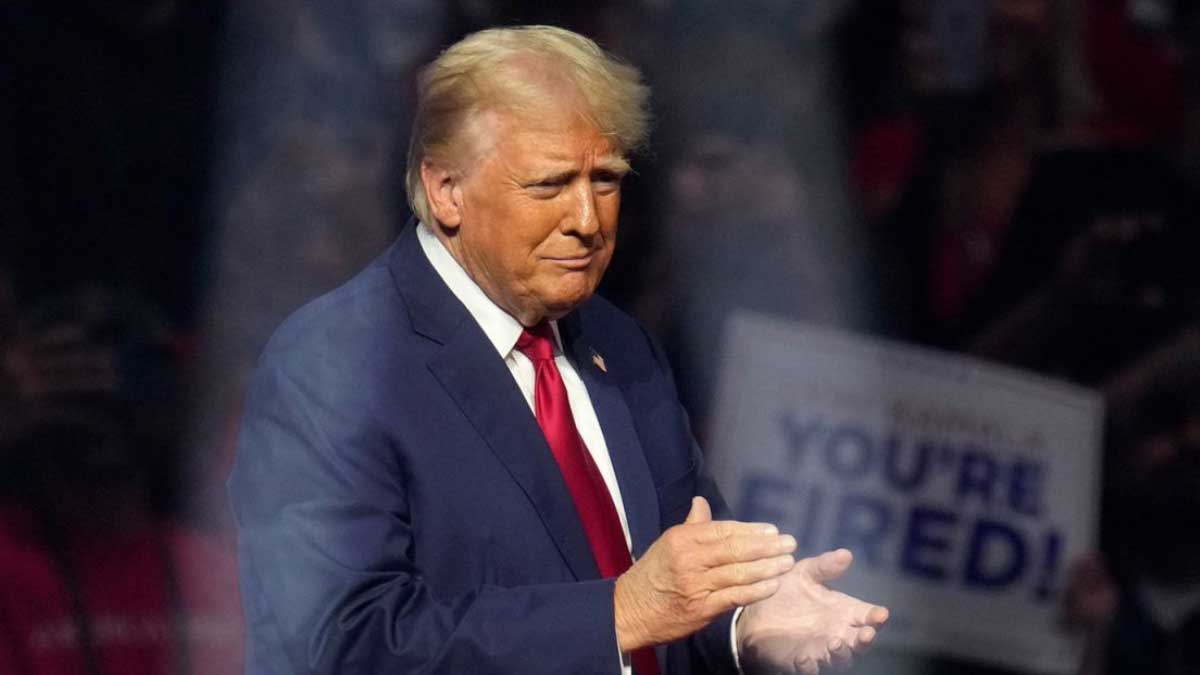- Home
- Billionaires
- Investing Newsletters
- 193CC 1000
- Article Layout 2
- Article Layout 3
- Article Layout 4
- Article Layout 5
- Article Layout 6
- Article Layout 7
- Article Layout 8
- Article Layout 9
- Article Layout 10
- Article Layout 11
- Article Layout 12
- Article Layout 13
- Article Layout 14
- Article Sidebar
- Post Format
- pages
- Archive Layouts
- Post Gallery
- Post Video Background
- Post Review
- Sponsored Post
- Leadership
- Business
- Money
- Small Business
- Innovation
- Shop
Recent Posts
Trump’s 60-Day Rule Claim Misinterprets DOJ Guidelines

Former President Donald Trump recently claimed that Special Counsel Jack Smith should not have been permitted to file an updated indictment against him in the federal election case so close to the upcoming election. Trump cited the Justice Department’s informal “60-day rule,” which advises against taking any action that could influence an election within 60 days of the election date. However, Trump’s assertion overlooks several key legal nuances, and his interpretation of the rule does not align with its actual application.
On Tuesday, Smith filed an updated indictment against Trump. This new filing adjusted some of the allegations in the case concerning Trump’s attempts to overturn the 2020 election. The updated indictment followed a Supreme Court ruling that granted Trump some immunity from criminal charges related to his actions while he was president. In response, Trump expressed his outrage on his social media platform, Truth Social, accusing the Justice Department of violating its own rules. Trump argued that the DOJ should not be allowed to bring cases so close to an election, claiming it was a “direct assault on Democracy.”
The so-called 60-day rule that Trump referenced is an informal guideline rather than a binding legal requirement. It advises federal prosecutors to avoid taking significant steps in investigations, such as filing new charges, within 60 days of an election if those actions could potentially affect the election’s outcome. The rule stems from a broader DOJ policy that federal prosecutors and agents should not time their actions, including investigative steps or criminal charges, with the intent of influencing any election.
However, legal experts clarify that this rule is typically relevant only to new investigations and not to cases already in progress. Once a case has been charged and is in the judicial system, the timing and progress of that case are generally under the purview of the courts, not the DOJ. Since the charges against Trump have been pending since last year, with the updated indictment merely tweaking some existing allegations, the 60-day rule does not apply here.
Even if the rule did apply to Trump’s case, its impact would be minimal. The rule is voluntary and carries no legal penalties if violated. Additionally, Smith filed the updated indictment 70 days before the election, which places it outside the 60-day window of concern. Therefore, even under the strictest interpretation of the rule, the DOJ’s actions do not violate any formal policy.
Legal experts, including Randall Eliason, a former federal prosecutor and professor at George Washington University Law School, have reinforced this view. Eliason tweeted that the DOJ’s “rule” is a voluntary guideline and not a legal requirement, emphasizing that it does not apply to cases that have already been publicly indicted. He further noted that the cutoff for the 60-day window, which begins around Labor Day, has not even been reached yet in this instance.
Trump’s legal battle over the 2020 election continues to advance in federal court, though a trial is not imminent. Both prosecutors and Trump’s legal team are expected to submit reports outlining how they believe the case should proceed. U.S. District Judge Tanya Chutkan has scheduled a hearing for September 5 to determine the next steps. Trump’s legal team is likely to attempt to dismiss the charges outlined in the updated indictment, but these efforts could take considerable time to resolve and may even reach the Supreme Court again.
This is not the first time Trump has invoked the DOJ’s 60-day rule in an attempt to undermine legal actions against him. Earlier this year, he argued that the cases against him should be halted entirely due to the DOJ’s policy against prosecuting political opponents during their campaigns. Legal experts quickly dismissed this claim, with Harvard Law School professor Genevieve Nadeau and former DOJ attorney Kristy Parker pointing out that such a rule would allow individuals to evade justice simply by running for office in a country with frequent elections. Despite these assertions, the New York Times reported that DOJ officials did consider whether to scale back their investigations into Trump ahead of the 2022 midterm elections, at a time when he had not yet been charged with any crimes.
The updated indictment filed against Trump on Tuesday maintains the same four felony counts he originally faced: conspiracy to defraud the United States, conspiracy to obstruct an official proceeding, obstruction of an official proceeding, and conspiracy against rights. The indictment has been revised to clarify that Trump’s actions in attempting to overturn the 2020 election were undertaken as a political candidate or private citizen, rather than in his official capacity as president. This change was made in light of the Supreme Court’s recent ruling, which stated that Trump could only be charged for unofficial acts that fall outside the scope of his presidential duties. Additionally, the updated indictment removes certain allegations related to Trump pressuring DOJ officials to overturn the election, following the Supreme Court’s determination that such actions were part of his official duties.
The Supreme Court’s ruling left much of the case’s details to be decided by Judge Chutkan, including what aspects of Trump’s conduct could be considered official acts and therefore immune from prosecution. The updated indictment still includes allegations that Trump is expected to argue are covered by the immunity ruling, such as his attempts to pressure then-Vice President Mike Pence to refuse to certify the election results.
The 60-day rule has garnered attention in the past, most notably during the 2016 election in connection with the federal investigation into Hillary Clinton’s use of a private email server. Former FBI Director James Comey was criticized for potentially violating the rule when he notified Congress in October 2016 that the FBI was examining newly discovered emails related to the investigation. Although Comey defended his decision, arguing that withholding the information would have been misleading, the controversy highlighted the complexities of applying the 60-day rule in practice.
In summary, Trump’s claim that Jack Smith’s updated indictment violates the DOJ’s 60-day rule is legally unfounded. The rule does not apply to cases already in court, is voluntary, and was not even violated based on the timing of the indictment’s filing. As the legal proceedings continue, Trump’s defense team will likely explore other strategies to challenge the charges, but the 60-day rule will not be a decisive factor in this case.
Recent Posts
Categories
- 193 Countries Consortium Partner1
- 193cc Digital Assets2
- 5G1
- Aerospace & Defense48
- AI37
- Arts3
- Banking & Insurance11
- Big Data3
- Billionaires1,261
- Boats & Planes1
- Business332
- Careers13
- Cars & Bikes79
- CEO Network1
- CFO Network17
- CHRO Network1
- CIO Network1
- Cloud10
- CMO Network18
- Commercial Real Estate7
- Consultant1
- Consumer Tech194
- CxO1
- Cybersecurity73
- Dining1
- Diversity, Equity & Inclusion4
- Education7
- Energy8
- Enterprise Tech29
- Events11
- Fintech1
- Food & Drink2
- Franchises1
- Freelance1
- Future Of Work2
- Games149
- GIG1
- Healthcare79
- Hollywood & Entertainment203
- Houses1
- India’s 1000 Richest1
- Innovation46
- Investing2
- Investing Newsletters4
- Leadership65
- Lifestyle11
- Manufacturing1
- Markets20
- Media327
- Mobile phone1
- Money13
- Personal Finance2
- Policy569
- Real Estate1
- Research6
- Retail1
- Retirement1
- Small Business1
- SportsMoney42
- Style & Beauty1
- Success Income1
- Taxes2
- Travel10
- Uncategorized13
- Vices1
- Watches & Jewelry2
- world's billionaires1,230
- Worlds Richest Self-Made Women2
Related Articles
South Korea Plane Crash: A Tragic Loss and Global Mourning
The tragic plane crash at South Korea’s Muan International Airport on Sunday...
By 193cc Agency CouncilDecember 30, 2024H-1B Visa Debate Splits Trump Allies and Silicon Valley
The debate over H-1B visas has once again become a contentious issue,...
By 193cc Agency CouncilDecember 28, 2024Trump Moves $4B Stake in Truth Social Parent, Stock Drops 6%
Donald Trump recently transferred his 57% stake in Trump Media & Technology...
By 193cc Agency CouncilDecember 20, 2024House Rejects Trump-Backed Funding Bill, Shutdown Looms
The U.S. House of Representatives rejected a new government funding bill on...
By 193cc Agency CouncilDecember 20, 2024















Leave a comment